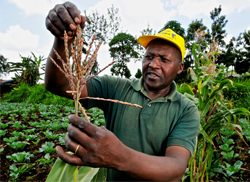
Farmers have been advised to buy seeds from licensed stockists or agrovet stores to avoid losses. Speaking during a farmers’ exhibition at Sigot in Nandi County, agricultural experts told farmers to avoid buying seeds that have been divided into smaller rations. “What you produce depends on what you plant. I am also urging you not to re-cycle seed from your farms,” Kenya Plant Health Inspectorate Service officer Charles Onyango said.
He said nothing will come out western Kenya’s good climate if farmers plant poor quality seeds. Mr Onyango said those licensed to sell farm inputs are trained by Kephis and that in case of crop failure, they could easily trace the origin of the seeds.
“Each seed container or packet must be sealed and its weight indicated clearly with a batch number and manufacturer’s details,” he said.
Quality marks, lot number, logo of the manufacturer and the variety must also be indicated.
“Always get receipts for each purchase and report any suspicious seed quality to the nearest Kephis office, Ministry of Agriculture, seed company, the provincial administration or police,” he advised farmers.The officer also tipped farmers to test their soils to know the fertility status before planting, saying seed quality is not enough for a good crop.
“Some farmers only know about DAP and CAN and use it even when it is not necessary and when the soil needs other nutrients instead,” he added.
He said testing can be done at the Kitale laboratory or at the Eldoret International Airport facility. He also urged farmers to buy seedlings and other planting materials only from registered nurseries. This, he said, will help curb the spread of pests and diseases.
Jonah Kebenei from the Agriculture ministry urged farmers to embrace irrigation and green houses to optimise use of their farms.
Climate change, he said, has adversely affected farmers’ programmes because the rain season has shifted from February to April.
